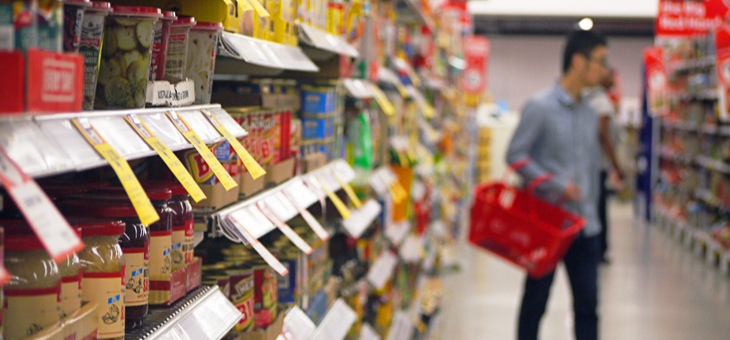Bare shelves and supply chain issues highlight the problem with Australia’s supermarket duopoly, say industry experts, who are calling for immediate changes to improve competition and supply.
Coles and Woolworths control 66 per cent of Australia’s grocery retail market – more than Aldi, IGA and independent outlets combined.
However, even with all the buying power the supermarket giants have at their disposal, many of their stores’ shelves are bare, whereas most independent retailers and smaller vendors have managed to keep shelves full throughout the Omicron outbreak
The structure of the industry has exacerbated the disruption caused by the rapid Omicron outbreak, business expert Prashan Karunaratne told the ABC.
“Perhaps it’s not beneficial to Australia in the long term if we are reliant on these concentrated supply chains which don’t deliver when such shocks hit,” says Dr Karunaratne.
Supply chains have been crippled in most states and territories. Omicron has forced thousands of processing, packaging, transport and distribution workers, and supermarket staff into isolation.
The resulting bare shelves have sent shoppers into a spin, leading them to panic buy, go without, or seek alternative supplies.
Dr Karunaratne blames Australia’s supermarket duopoly for our precarious position, adding that our “oligopolistic” situation is unique compared to other developed economies.
“The usual supply chain issues, during some sort of crisis or otherwise, are a little more pronounced in Australia’s case because we have a more concentrated market structure in this grocery chain space,” he says.
Coles and Woolworths rely on centralised facilities and distribution centres, where produce and products are processed then freighted across the country. Omicron has ripped through these facilities and highlighted them as ‘weak links’ in the chain.
Read: Call for isolation exemptions as supermarkets battle shortages
“They have an over-reliance on central facilities and therefore we have less of them in Australia,” he says.
“Therefore, any disruption causes a larger proportional disruption.”
The supply chain story is very different for independent retailers, butchers and grocers, and has advantages in situations such as these, says National Farmers Federation president Fiona Simpson.
“At the moment, a lot of the independent retailers and smaller fresh food markets and butchers are doing much better than the bigger supermarkets,” says Ms Simpson.
Smaller and nimbler supply chains during COVID highlight the need for more competition, she adds.
“For us, that’s a reflection on competition policy, which, for a while in Australia, has had the supply chain being focused in the hands of a couple of very big players,” she said.
“It’s something we need to focus on in Australia as we go forward and look at the future and what effect pandemics have.”
Read: Supermarkets to work together to ensure grocery supply
It seems there is no quick fix for Australia’s grocery “oligopoly”, but policy reforms could incentivise smaller players to create farmers’ collectives or independents to expand and occupy a bigger market share.
“Given a small manufacturing sector, given a concentrated market structure in the packaging industry, given a concentrated market structure in the grocery industry, these are systemic structural issues that will take long-term micro-economic reform to address,” says Dr Karunaratne.
In the meantime, Aussie shoppers would be well served – in every sense of the word – by frequenting their local independent retailer.
Read: Supermarket strategies that get you spending
According to independent supermarket owner Bevan Betros, the only supply independents seem to be short on is toilet paper.
“I think there’s next to no lines we’re out of as far as fruit and veg goes,” says Mr Betros.
“Independents like ourselves, we’re at the market every day and we buy what we want and bring it up or our local growers bring it in, because the stuff has to go – it doesn’t stop growing.
“There’s no shortage of anything really. It’s all to do with our distribution systems.”
How have you been finding supplies during the Omicron wave? What have you found difficult to find? How do you work around this? Do you have any tips you could share with our members?
If you enjoy our content, don’t keep it to yourself. Share our free eNews with your friends and encourage them to sign up.

